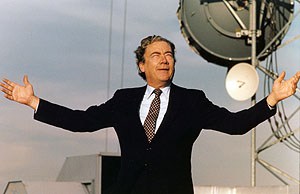On September 13, most PBS stations will premiere a new documentary, “Bill McGowan, Long Distance Warrior” exploring the many trials and tribulations of MCI Corporation, the long distance and e-mail provider that was instrumental in breaking up Ma Bell’s monopoly in telephone service.
[flv width=”512″ height=”308″]http://www.phillipdampier.com/video/Long Distance Warrior.flv[/flv]
A preview of PBS’ Long Distance Warrior, which premieres on most PBS stations Sept. 13 (3 minutes)
 For those under 30, “MCI” may not mean much. The company that helped pioneer competitive long distance calling was absorbed into the Worldcom empire in 1997, where it continued to provide service until a major corporate accounting scandal brought Worldcom down in 2002. Most of what was left was eventually sold to Verizon Communications in 2005.
For those under 30, “MCI” may not mean much. The company that helped pioneer competitive long distance calling was absorbed into the Worldcom empire in 1997, where it continued to provide service until a major corporate accounting scandal brought Worldcom down in 2002. Most of what was left was eventually sold to Verizon Communications in 2005.
Remarkably, Microwave Communications, Inc. (MCI) was founded all the way back in 1963, but not as a provider of telephone services. That MCI sought to build a network of microwave relay stations between Chicago and St. Louis to provide uninterrupted two-way radio service for some of the nation’s largest trucking and shipping companies.

The Bell System
By the late 1960s, William G. McGowan, an investor and venture capitalist from New York won a seat on MCI’s board of directors and part ownership of a newly-envisioned version of MCI — one that would provide businesses with a range of telecommunications products, including long distance telephone connections. With many American corporations maintaining branch and regional offices, connecting them together was a potentially very lucrative business, especially if MCI could deliver the service at prices cheaper than what the monopoly Bell System was charging.
With their microwave relay network, now expanding across the country, MCI could distribute long distance phone calls cheaply and efficiently, if they could find a way to connect that network to Bell’s local phone system. After all, it does little good to offer long distance service if you cannot connect calls to the businesses’ existing telephone equipment.
That’s where AT&T and its Bell Operating Companies objected. For them, only calls originating on and delivered over their own network should be allowed. MCI, as an interloper, was seeking to use the network AT&T built and paid for. It’s an argument that has echoed more than 30 years later, when AT&T’s then-CEO Ed Whitacre objected to outside Internet content providers “using AT&T’s pipes for free.”
[flv]http://www.phillipdampier.com/video/MCI First 20 Years.mp4[/flv]
On the occasion of MCI’s 20th anniversary, the company produced this retrospective exploring the difficult times competing with AT&T and the Bell System. (9 minutes)

MCI's best argument: AT&T's long distance bills
McGowan confronted arguments from AT&T executives who warned that competitive long distance would destroy the business model of America’s Bell System, which provided affordable local phone service to all 50 states, in part subsidized by long distance telephone rates, mostly paid by its commercial customers. Tamper with that, they warned, and local phone bills would be forced to soar to make up the difference.
MCI called that argument a scare tactic, and suggested instead that AT&T’s monopoly had grown inefficient, bloated, expensive, and resistant to innovation and change. MCI could deliver a substantially less expensive service and would force AT&T to increase its own efficiency to compete. AT&T wasn’t interested in that argument and sued, repeatedly, to keep MCI out of its business.
By 1984, federal courts declared AT&T a monopoly worthy of a break-up, and opened the door to MCI’s long distance network. By that time, MCI was already thinking about evolving itself beyond a business long distance provider, whose network was largely idle after business hours. Because most Americans were accustomed to making long distance calls at night when rates were substantially lower, MCI developed new residential long distance service plans that encouraged customers to use that idle network at night and on weekends.
[flv width=”640″ height=”447″]http://www.phillipdampier.com/video/crying_mother.f4v[/flv]
One of MCI’s most memorable ads features a sobbing mother who reached out and touched her son over long distance a little too much. (1 minute)
 Thus began more than a decade of heavy advertising and competition for the long distance telephone market. With equal access rules in place, consumers could choose their own long distance phone company and shop for the one with the lowest rates. Competitors like Sprint, WilTel, LDDS, RCI, LCI, and yes, even AT&T all pitched their own calling plans.
Thus began more than a decade of heavy advertising and competition for the long distance telephone market. With equal access rules in place, consumers could choose their own long distance phone company and shop for the one with the lowest rates. Competitors like Sprint, WilTel, LDDS, RCI, LCI, and yes, even AT&T all pitched their own calling plans.
MCI also pioneered MCI Mail, one of the first commercial electronic mail systems. The original concept had businesses typing letters on a computer terminal, printed on standard paper at an MCI office closest to the destination, and then mailed in an envelope through the U.S. Post Office. This poor-man’s version of a telex or telegram worked for businesses that wanted overnight delivery, but not at the prices charged by shippers like Federal Express. In larger cities, MCI Mail could offer businesses delivery of their electronic communications within four hours, something closer to a traditional telegram of days gone-by.
MCI Mail’s hard copy deliveries wouldn’t last long, of course. As the 1980s progressed, the fax machine and the more familiar all-electronic e-mail we think of today became firmly established. As MCI Mail became less relevant, the company innovated into offering low priced telex services, mass-faxing, and data backhaul services to provide connectivity for online networks.
[flv width=”504″ height=”400″]http://www.phillipdampier.com/video/WIBW MCI Mail 1984.flv[/flv]
WIBW explores a new concept in communications — something called ‘electronic mail,’ a service that bewildered consumers in the early 1980s. This report from 1984. (2 minutes)

Bill McGowan: Would not approve of AT&T's plans to restore the glory days of the past.
AT&T, in contrast, was still getting over the loss of its local Bell Operating Companies — the regional phone companies most Americans did business with, and the loss of revenue earned from renting telephone equipment. For years, AT&T long distance was branded as a quality leader, not a price leader. It maintained its enormous market share partly through consumer indifference — customers who did not initially choose a new long distance carrier remained with AT&T, the default choice.
It took only about a decade after the Bell break-up for telecom industry lobbyists to begin advocating for enough deregulation to allow many of those former Baby Bells to re-combine through mergers and acquisitions. The result is today’s AT&T, formed from its long distance unit, BellSouth, Illinois Bell, Indiana Bell, Michigan Bell, Nevada Bell, Ohio Bell, Pacific Bell, Southwestern Bell, Wisconsin Bell, and Southern New England Telephone. Its largest competitor is Verizon Communications, which itself resulted from a combination of Bell Atlantic, NYNEX, GTE, and what was left of MCI after Worldcom was through with it.
McGowan’s fight was a personally costly one. A workaholic, McGowan routinely put in 15 hour work days and drank up to 20 cups of coffee daily. His heart finally had enough and McGowan succumbed to a heart attack in 1992 at age 64. But he leaves a legacy and two decades of fighting to break up AT&T’s monopoly, which he always believed was bad for consumers and business (unless you were AT&T, of course). That’s an important message as AT&T strengthens its resolve to acquire one of its significant competitors in the profitable wireless market — T-Mobile. McGowan would have never approved.
[flv]http://www.phillipdampier.com/video/KCSM San Mateo Electronic Mail 6-18-87.mp4[/flv]
“The Computer Chronicles,” a production of KCSM-TV, spent a half hour in June 1987 showing off electronic e-mail service from MCI and how consumers and businesses using something called a “modem” could connect their home computers with online databases and services to exchange information and communications back and forth. And for those business travelers on the road, away from their office computers, Speech Plus offered a product that could still keep you “connected,” by reading your e-mail to you over the phone. In 1987, outside of commercial pay networks like CompuServe, Delphi, PeopleLink and QuantumLink, most Americans with modems used them to connect to typically-free hobbyist-run computer bulletin board systems. Widespread access to “the Internet” would take another 5-6 years. (29 minutes)
 Verizon Communications has fired six workers and suspended more than three dozen others in Taunton, Mass. for engaging in “illegal gambling.”
Verizon Communications has fired six workers and suspended more than three dozen others in Taunton, Mass. for engaging in “illegal gambling.”

 Subscribe
Subscribe








